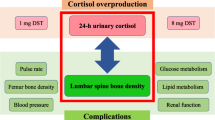Play all audios:

ABSTRACT THE hypercalcaemia which occurs in adrenalectomized animals or in patients with Cushing's disease treated by subtotal adrenalectomy has been thought to be the result of
antagonism between secretions from the adrenal gland and parathyroid hormone1. Because cortisone produces hypocalcaemia, this hormone was thought to be the adrenal factor that influenced
calcium homeostasis. A brief review of the history of these findings was given by Myers _et al._2, who investigated the subject further in adult adrenalectomized dogs. They reported the
development of hypercalcaemia in these animals when cortisone therapy was withdrawn; however, subsequent thyro-parathyroidectomy of the animals failed to prevent the hypercalcaemia of
adrenal insufficiency. Our attention was caught by the fact that the dogs studied by Myers _et al._ lacked secretions from both the thyroids and the parathyroids. It has been shown that
thyroxine and calcitonin, both coming from the thyroid gland, are important in mineral metabolism3,4. This report describes the results of a study designed to find out whether secretions
from the thyroid, alone or in conjunction with parathyroid hormone, are important in the development of the hypercalcaemia of cortisone lack. Access through your institution Buy or subscribe
This is a preview of subscription content, access via your institution ACCESS OPTIONS Access through your institution Subscribe to this journal Receive 51 print issues and online access
$199.00 per year only $3.90 per issue Learn more Buy this article * Purchase on SpringerLink * Instant access to full article PDF Buy now Prices may be subject to local taxes which are
calculated during checkout ADDITIONAL ACCESS OPTIONS: * Log in * Learn about institutional subscriptions * Read our FAQs * Contact customer support SIMILAR CONTENT BEING VIEWED BY OTHERS
URINARY FREE CORTISOL EXCRETION IS ASSOCIATED WITH LUMBAR BONE DENSITY IN PATIENTS WITH ADRENAL CUSHING’S SYNDROME Article 20 May 2022 PREOPERATIVE VITAMIN D LEVELS AS A PREDICTOR OF
TRANSIENT HYPOCALCEMIA AND HYPOPARATHYROIDISM AFTER PARATHYROIDECTOMY Article Open access 18 June 2020 POSTOPERATIVE ADRENAL INSUFFICIENCY IN CONN’S SYNDROME—DOES IT OCCUR FREQUENTLY?
Article 06 October 2021 REFERENCES * Eliel, L. P., Thomsen, C., and Chanes, R., _J. Clin. Endocrinol._, 25, 457 (1965). Article CAS Google Scholar * Myers, W. P. L., Rothschild, E. O.,
and Lawrence, jun., W., in _Bone and Tooth: Proceedings of the First European Symposium held at Somerville College, Oxford, April, 1963_ (edit. by Blackwood, H. J. J.), 193 (Macmillan
Company, New York, 1964). Google Scholar * Adams, P., and Jowsey, Jenifer, _Endocrinology_, 81, 735 (1967). Article CAS Google Scholar * Balogh, K., Roth, S. I., and Pechet, M. M., in
_Program of the 49th Meeting of the Endocrine Society_ (1967). Google Scholar * Dent, C. E., _Brit. Med. J._, ii, 1419 (1962). * Walser, M., Robinson, B. H. B., and Duckett, jun., J. W.,
_J. Clin. Invest._, 42, 456 (1963). Article CAS Google Scholar * Storey, E., _Endocrinology_, 68, 533 (1961). Article CAS Google Scholar * Follis, jun., R. H., _Bull. Johns Hopkins
Hosp._, 88, 440 (1951). PubMed Google Scholar Download references AUTHOR INFORMATION AUTHORS AND AFFILIATIONS * Mayo Clinic and Mayo Foundation, Rochester, Minnesota JENIFER JOWSEY * Mayo
Graduate School of Medicine, University of Minnesota, Rochester, Minnesota GEORGE W. SIMONS Authors * JENIFER JOWSEY View author publications You can also search for this author inPubMed
Google Scholar * GEORGE W. SIMONS View author publications You can also search for this author inPubMed Google Scholar RIGHTS AND PERMISSIONS Reprints and permissions ABOUT THIS ARTICLE CITE
THIS ARTICLE JOWSEY, J., SIMONS, G. Normocalcaemia in relation to Cortisone Secretion. _Nature_ 217, 1277–1279 (1968). https://doi.org/10.1038/2171277a0 Download citation * Received: 12
February 1968 * Issue Date: 30 March 1968 * DOI: https://doi.org/10.1038/2171277a0 SHARE THIS ARTICLE Anyone you share the following link with will be able to read this content: Get
shareable link Sorry, a shareable link is not currently available for this article. Copy to clipboard Provided by the Springer Nature SharedIt content-sharing initiative
